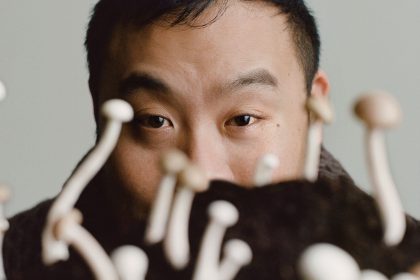
Superchef David Chang is transforming his restaurant business into a multimedia empire. The restauranteur, author, publisher, TV celebrity and podcast host announced this month that he’s adding another television gig to his resume: “Family Style.” Chang will co-host the food-centric talk show with celebrity and cookbook author Chrissy Teigen.
“We’re not trying to promote the restaurant; we’re trying to promote our ideals. And I think, to the younger generation, that’s more important to them than ever before,” Chang said at Recode’s Code Conference.
The Korean-American founder of Momofuku restaurant is known for shaking up the restaurant industry with cutting-edge culinary innovations. A major proponent of fermentation, Chang’s innovation in the cooking technique has propelled fermentation’s recent renaissance in America. In his Kaizen Trading Company fermentation lab, Chang develops his own line of fermented products for restaurants.
Chang aims for his media projects to reflect the values of the restaurants he’s created all over the world – authentic and honest. He compared starting a food-based media company, Majordomo Media, to chef Wolfgang Puck’s entrepreneurship. Puck “created a giant business of every kind of thing related to food,” like consumer-packaged goods, cookware and catering.
“If the media takes off, that’s more stuff we can bring back to the restaurants,” Chang said. The media arm feeds his restaurants. “Maybe people will never want to pay that much money for [Momofuku] food, maybe we can subsidize some of the costs with [the media projects] that’s alleviating our bills.”
Changing Kitchen Atmosphere
Majordomo Media produces the Netflix series “Ugly Delicious” and the podcast “The David Chang Show.” Chang won’t discuss viewership numbers. But he says the exposure has made Momofuku busier than ever, and that’s not because the restaurant is featured heavily in the TV show. It’s the message about the food industry and corporate responsibility that sticks with viewers, piquing their interest in Momofuku.
“Everyone has an understanding of food now; the food awareness is higher than ever before,” Chang said. “But no one quite wants to understand how that food gets made. They understand maybe from an environmental perspective, but they don’t understand it from a restaurant perspective.”
Customers should make themselves aware of restaurant ownership, especially in a post #MeToo world when sexual assault accusations have put into light the deplorable behavior of restauranteurs like Mario Batali.
Important, too, are proper working conditions. The culinary industry is historically a “brutish system,” Chang said. The hours are long and tiring. Today’s labor force is changing workplace culture, though. Millennial employees are disrupting the horse race work pace, they are “allergic to the working conditions and the stress that we were creating.”
“You work long hours in the culinary world, and I’ve always believed that the culinary world and those that lead people in the culinary world have maybe one of the hardest jobs because you can’t motivate people with a giant stock option package or a giant bonus that you might get on Wall Street. You have to motivate someone to do physical hard labor and to try and get better at that through sheer integrity and personal will and that’s hard, that’s incredibly hard to motivate people,” Chang said.
He added: “How do you balance out what’s essentially still a blue-collar labor, which is cooking, [that] is now glamourized to a point that it now has white-collar values? That’s a collision that’s hard to mitigate and sort out.”
Chang’s creating that white-collar environment at his restaurants, giving vacation days, mandatory breaks and a shift drink at the end of a service. He wants to professionalize the restaurant industry when, historically, it’s never been professional.
“I’ve been so allergic to a corporate body for so many years, but now I think I’ve convinced myself it’s the only way to go,” Chang said.
Experimental Triumphs & Failures
Lauded as the bad boy in the food world, Chang is a chef willing to take unapologetic risks. His innovation has not come without failures, though. Lucky Peach, the award-winning food magazine he co-founded, shuttered after creative differences. Maple, a New York food service Chang backed that prepared and delivered gourmet food, folded amidst massive debt. Ando, another Chang backed food delivery service, suddenly closed, then was acquired by Uber Eats. Chang closed Má Pêche last year, citing declining foot traffic around New York’s midtown thanks to extra security at Trump Tower. New York Italian restaurant Momofuku Nishi closed too after a touch review, then remodeled and reopened.
That review – by Pete Wells of the New York Times – was Momofuku’s first bad review. It destroyed the restaurant, Chang said. But he added that he’s weirdly thankful for that review because it helped Momofuku reevaluate, “our restaurants around the world are doing better than before because of that review.”
“My fear is that once you become too systemized in the restaurant industry, you’re going to lose any of the coolness, creative parts,” Chang said. “I got into cooking because it wasn’t cool. Everyone thought it was career suicide when I said ‘Hey I’m going to start to cook,’ it was sort of that sense of danger, that sense of recklessness that no longer really exists.”
“It’s completely different than a tech business because scaling a brand in food, yes, it can work in McDonald’s or if you have a beverage,” Chang said. “But the idea of scaling something that’s intimate, some kind of contract between you and a prospective diner, that’s hard because we’re still trying to be best in class in making the most thoughtful, delicious food and it’s hard to scale excellence I think.”
(Photo by Wall Street Journal)
